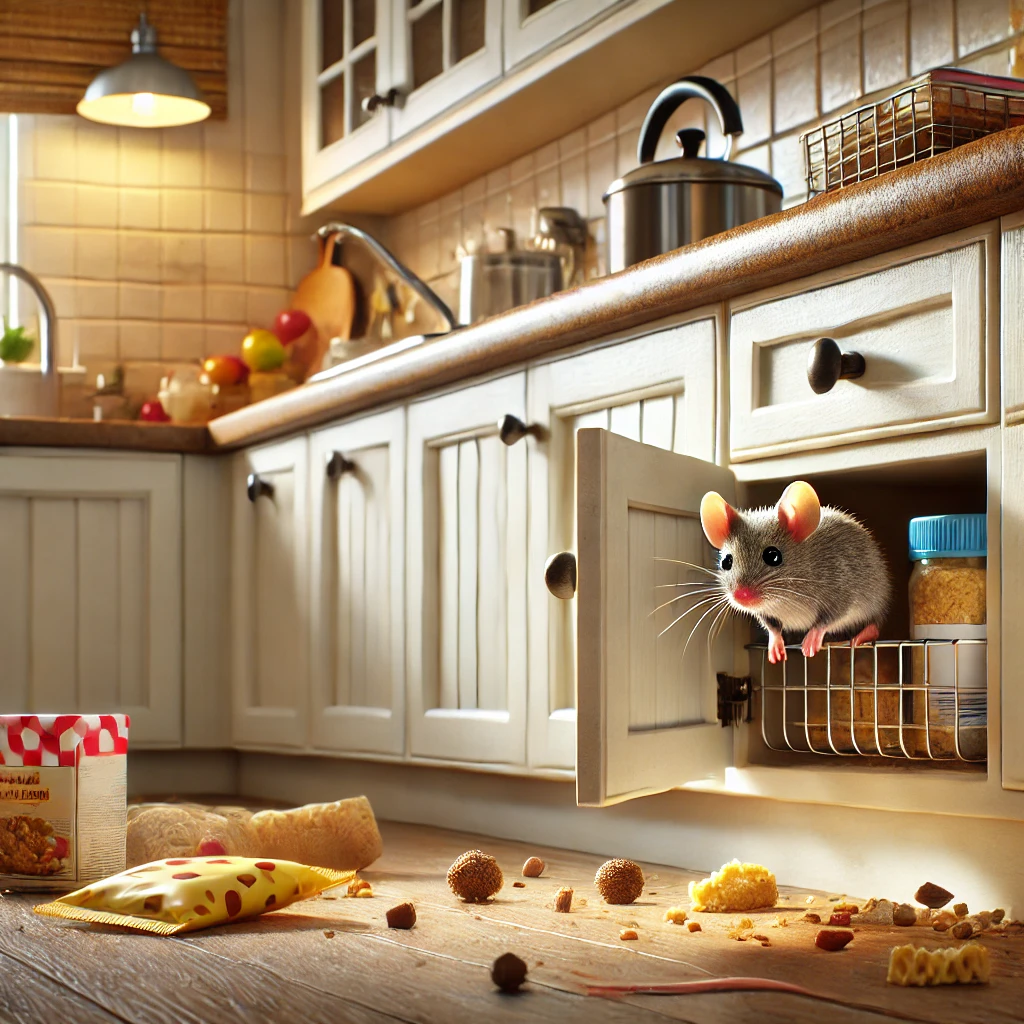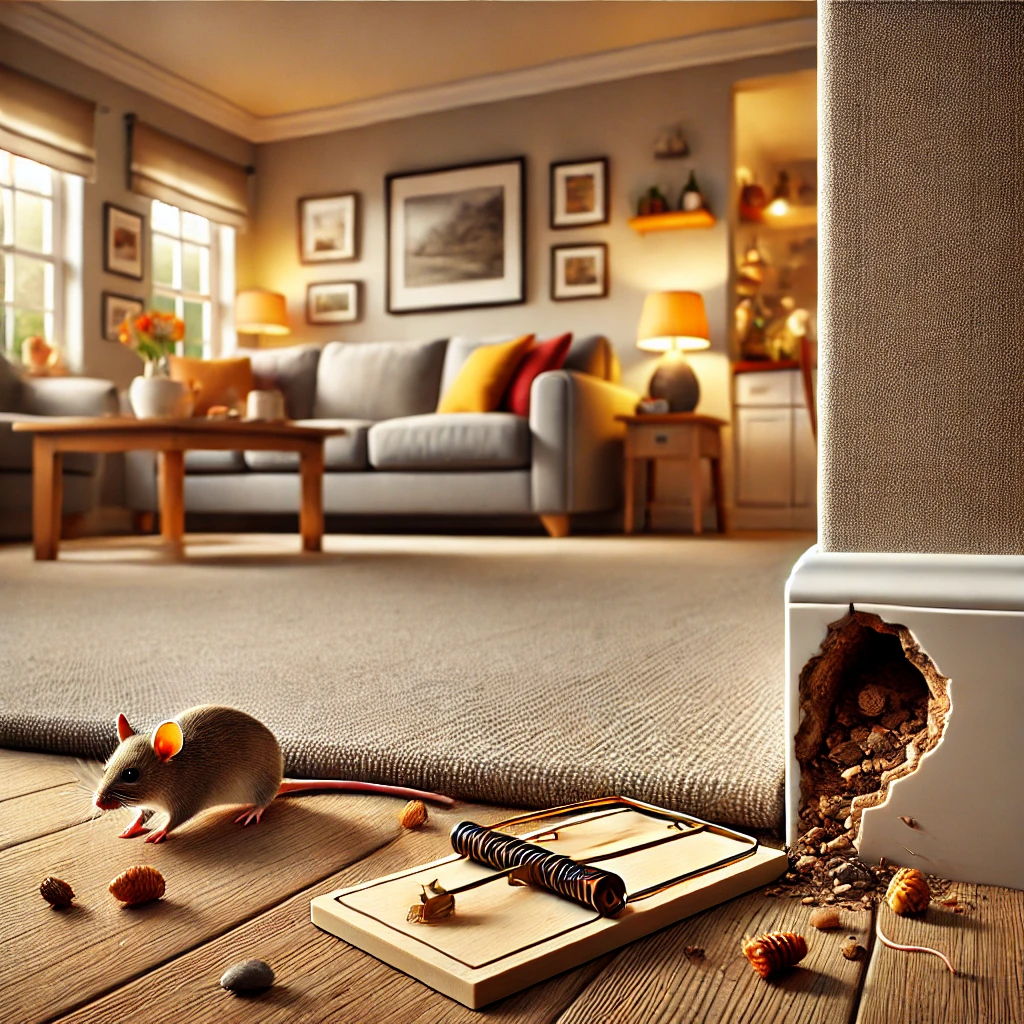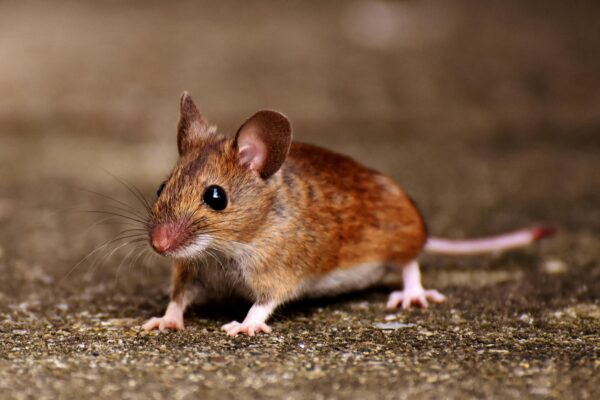When most people think of household pests, they may immediately picture ants, spiders, or termites. One often overlooked intruder is the humble mouse.
While small and seemingly harmless, all rodents can cause significant health hazards in your home. Whether you’re dealing with a single mouse or an infestation, it’s important to understand the risks these pests pose. The pest professionals at Janssen Pest Solutions are here to explore the various health dangers that mice bring with them and why they should never be taken lightly.
Key Takeaways
- Health Risks: Mice are carriers of numerous dangerous diseases, including leptospirosis, salmonella, and hantavirus, which can significantly impact your health if left unchecked.
- Food Contamination: Mice often contaminate food through their droppings, urine, and chewing on packaging, making even the smallest signs of infestation a potential food safety hazard.
- Allergy Triggers: Mouse urine, saliva, and dander can trigger allergic reactions and worsen asthma symptoms, especially in children and sensitive individuals.
- Property Damage: Mice are not just a health risk but can cause extensive damage to your home’s wiring, insulation, and structural integrity, leading to both financial and health costs.
- Secondary Pests: Mice infestations often attract additional pests, such as fleas, ticks, and mites, which can introduce further diseases and complications.
- Professional Help Is Key: Eliminating a mouse infestation is challenging without professional pest control. Expert intervention ensures thorough removal and long-term prevention.

1. Mice Carry Diseases
Mice and other rodents are more than pesky creatures—they are vectors for a wide range of dangerous diseases. They are notorious for carrying bacteria, viruses, and other pathogens that can put your health at serious risk.
- Leptospirosis: This bacterial infection is primarily transmitted through the urine of infected rodents. Ingesting contaminated water or coming into contact with urine can lead to severe liver and kidney damage, meningitis, or even death if left untreated.
- Salmonella: Mice can spread salmonella bacteria through their feces, saliva, or urine. When mice come into contact with food, utensils, or surfaces, they can easily contaminate them. This can lead to food poisoning, causing nausea, vomiting, and diarrhea.
- Hantavirus: One of the most severe diseases mice carry, hantavirus, is primarily spread through contact with mouse droppings, urine, or saliva. This disease can cause severe respiratory problems, and in some cases, it can be fatal.
- Other Diseases: Mice are also known to transmit other diseases like lymphocytic choriomeningitis virus (LCMV), rat-bite fever, and tularemia, all of which can result in severe health complications if not properly treated.
Supporting Sources: According to the Centers for Disease Control and Prevention (CDC), the diseases mice spread are serious health threats that require immediate attention if a rodent infestation is suspected.
2. Mice Contaminate Food
Food contamination is one of the most common and dangerous ways mice affect your household. These nocturnal creatures scavenge for food and leave a trail of contamination wherever they go.
- Urine and Feces: Mice leave behind urine, feces, and even hair wherever they roam. These droppings can contaminate food packaging and surfaces, posing a health risk even if the contamination is not visible to the naked eye. Mice can deposit harmful bacteria that can spread to your food without you even knowing it.
- Gnawing on Food: Mice are also notorious for chewing through food packaging in search of a meal. This exposes the food inside to contamination, and the gnaw marks left behind can create small entry points for bacteria.
Supporting Sources: The USDA’s food safety standards highlight how rodents like mice are a significant concern for food hygiene and safety. Contamination of food sources can easily lead to foodborne illnesses, making it crucial to maintain a pest-free environment.
3. Mice Spread Allergies
While many people associate allergies with pet dander or pollen, mice can be an unexpected trigger for asthma and other allergic reactions. Mice not only affect those who are allergic to them, but they can also worsen symptoms for individuals with pre-existing respiratory conditions.
- Allergenic Proteins: Mice produce allergens in their urine, saliva, and dander. These proteins are readily dispersed into the air, where they can be inhaled by anyone in the vicinity. For those who are allergic, this exposure can cause symptoms ranging from sneezing and coughing to more severe asthma attacks.
- Asthma and Respiratory Problems: Exposure to mouse allergens has been linked to an increase in asthma symptoms, particularly in children. Mouse droppings and urine are common triggers, and prolonged exposure can lead to chronic respiratory issues.
Supporting Sources: The American Lung Association has pointed out that rodent-related allergens significantly contribute to respiratory conditions, especially in urban environments like the Des Moines metro, where infestations are more common.
4. Mice Damage Property and Infrastructure
Mice don’t just pose a health risk—they can also cause significant damage to your property and home infrastructure, leading to even more indirect health hazards.
- Chewing on Electrical Wiring: Mice are notorious for gnawing on electrical wires, which can create a severe fire hazard. They’re attracted to the insulation around wires, and as they chew through, they can cause shorts or sparks that may ignite a fire. Electrical fires are a leading cause of house fires in the U.S., with rodents contributing to a portion of these incidents.
- Structural Damage: Mice are also known to cause significant damage to insulation, pipes, and walls. In the process, they create conditions that may encourage mold growth or compromise your home’s air quality. These structural issues can lead to long-term health risks, such as respiratory problems due to exposure to mold.
Supporting Sources: According to the National Fire Protection Association (NFPA), electrical fires caused by rodents are a serious concern, particularly when rodents chew on exposed wiring. Additionally, pest control experts often report finding substantial property damage caused by mice during infestations.

5. Mice Increase the Risk of Secondary Pests
When mice invade your home, they don’t just bring themselves—they also attract other pests that pose additional health risks.
- Flies and Mites: Mice often attract secondary pests like flies and mites, which can feed on their droppings or bodies. These pests can introduce further contamination and irritation, exacerbating the health risks in your home.
- Fleas and Ticks: Mice can also carry fleas and ticks, which are known to transmit diseases such as Lyme disease and the plague. While fleas and ticks are more commonly associated with larger animals, they can easily hitch a ride on mice, leading to a broader range of health concerns.
Supporting Sources: University of California’s Agriculture and Natural Resources reports how mice can increase the likelihood of secondary infestations by attracting these additional pests, further complicating your pest control efforts.
6. Mice Are Difficult to Eradicate Without Professional Help
While DIY solutions like traps and poisons might seem effective, they are often inadequate when it comes to entirely eliminating a mouse infestation. The risks of improper handling can also lead to increased health hazards.
- DIY Challenges: Although traps and poison can kill mice, they do not address the root of the infestation, and improper use can result in health risks if not handled carefully. Mice often nest in hard-to-reach areas, so attempting to eradicate them without professional help can lead to missed areas and a persistent problem.
- Professional Pest Control: Certified pest control specialists, like Janssen Pest Solutions, have the expertise and tools needed to thoroughly inspect your property, locate all nesting sites, and safely eliminate the problem. They can also help seal entry points and take preventative measures to avoid future infestations.
Supporting Sources: Local pest control services emphasize the importance of professional intervention to ensure complete eradication. Without expert knowledge, DIY methods may leave behind hidden populations that continue to pose health risks.
Conclusion
Mice may seem like a minor inconvenience at first, but they present significant health risks that should not be ignored. From carrying dangerous diseases to contaminating food, spreading allergies, damaging property, and attracting secondary pests, the potential dangers mice pose are severe. If you suspect an infestation, it’s important to act quickly and call in a professional pest control service to mitigate the risks. By taking proactive steps to eliminate mice, you can protect both your health and your home.
Don’t wait until the damage is done—contact us today if you suspect an infestation. Our friendly team is always happy to assist!
FAQ About Mice in Iowa
1. How do mice spread diseases?
Mice spread diseases through their urine, saliva, feces, and bites. When these contaminants come into contact with humans, they can cause various illnesses, including leptospirosis and hantavirus. According to the CDC, the risk of transmission increases when you handle or clean up after a mouse infestation without proper precautions, such as gloves or masks.
2. Can mice cause allergies in humans?
Yes, mice can trigger allergies due to the proteins found in their saliva, urine, and dander. These proteins are airborne and can lead to symptoms such as sneezing, coughing, and wheezing, especially for those with asthma or other respiratory conditions. The American Lung Association reports that rodent allergens are a significant asthma trigger in many households.
3. What should I do if I find mouse droppings in my kitchen?
If you find mouse droppings, it’s important to act quickly. Wear gloves and a mask when cleaning up to avoid direct contact with the droppings. Use a disinfectant to clean the area, and thoroughly wash any surfaces that may have come into contact with contaminated materials. Dispose of droppings in a sealed plastic bag to prevent further contamination.
4. How can I prevent mice from entering my home?
To prevent mice from entering your home, seal all cracks and holes in walls, doors, and windows. Pay attention to areas where pipes, cables, and vents enter your home. Additionally, keep food sealed and stored properly and eliminate any clutter that could provide nesting sites for mice. Pest control experts can also help with long-term prevention strategies.
5. Are DIY methods like traps and poison effective against mice?
While DIY methods such as traps and poison can help manage a small infestation, they are often insufficient for completely eliminating a mouse problem. Mice can nest in hard-to-reach places, and traps may not address the root cause of the infestation. Professionals have the tools and expertise to ensure a comprehensive, safe, and effective solution. For severe infestations, it’s best to consult with a pest control specialist.

